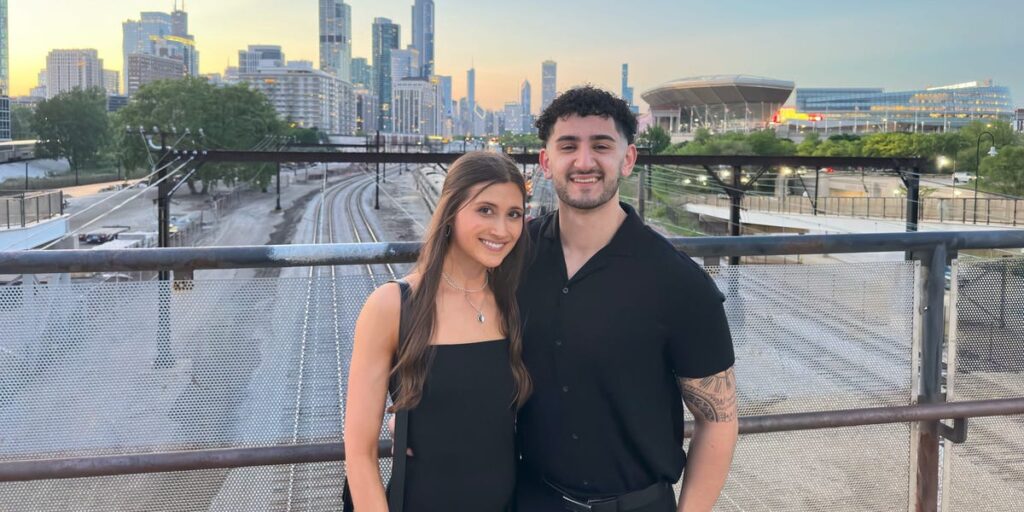Growing up, everything I knew about prenups was negative. I was used to movie depictions of women getting shorted by rich, overpowering men, rap songs glamorizing unequal payouts, and my own father advising me, “If someone wants to sign a prenup, run.”
My father had the same logic most people do: Prenups are disrespectful, transactional, and unromantic, assuming the doom of a marriage before it even starts. Little did he know that my partner and I were committed to signing one.
It was hard telling my father. I wondered if he’d see me differently — not as his strong, independent daughter but as a self-sacrificing people-pleaser who struggled to set boundaries. I also wondered if he’d resent my partner, even though we decided together and equally advocated for the cause.
To my surprise, my father went from dumbfounded to wholeheartedly supportive. His most recent remark surprised me — “I think everyone should do that.”
We don’t meet the typical profile
Unlike the stereotype, my partner and I aren’t celebrities, trust fund kids, or CEOs. We’re simply two 23-year-olds trying to get our start, one earning a modest income and the other powering through dental school with six figures of student debt. And yet, signing a prenup isn’t just a nice idea — it’s a non-negotiable for us, and it can’t be tied to a common upbringing.
I come from a classic, all-American household in upper-class suburbia. My partner was raised in a modest Lebanese-American family with deep cultural and religious roots. His family has hundreds; mine is small. His parents are immigrants; mine aren’t. He celebrates Ramadan; I celebrate Christmas.
We were shocked to be on the same page about a prenup.
Early conversations brought clarity
Signing a prenup was one of the first big-picture conversations we had, up there with where we’d settle down, how many kids we’d have, and what we consider a successful future.
My partner didn’t know it, but everything was banking on that initial discussion. Even though I wanted a prenup, too, my alarm bells rang when he first mentioned it. Selfish intentions would have been a dealbreaker.
It was important that his motives aligned with mine — and luckily, they did. I learned that he wasn’t scheming to craft a one-sided agreement to come out on top, but he wanted us both to feel protected and secure.
The early conversations didn’t hinder our relationship or squelch our excitement. If anything, they gave us stronger roots, deeper trust, and a wide-open policy for tough topics. They set the foundation for a communication style where honesty matters more than illusion. Romance hasn’t disappeared, but the rose-colored glasses have.
I later asked my partner why he felt comfortable suggesting a prenup in the first place. He explained that in his family’s religion, settling on post-marital financial arrangements is a requirement for marriage, so the subject didn’t feel taboo.
This connected some dots. I understood why he didn’t stutter bringing up a prenup.
It’s brought us closer
Pondering the terms has given our love a grown-up twist, one rooted in care and maturity. It’s created space to acknowledge each other’s values and better understand priorities, both financial and otherwise. It’s also sparked conversations about parenting, inheritances, goals, and spending habits, topics that are not only practical but essential to discuss before marriage.
A prenup opens the floor for us to contemplate: Will finances be separate, combined, or both? Are student loans individual obligations? What happens if one person becomes a full-time parent? How will we handle inheritances? We’re dedicated to mixing and matching the terms until win-win scenarios emerge.
It’s forced us to acknowledge that yes, marriage is about love, but it’s also a legal and financial partnership. Instead of shying away from difficult but relevant conversations, we’re navigating the murky waters proactively with transparency and fairness.
We’re writing our own story
A prenup makes our union feel personal, not like a blind leap into someone else’s cookie-cutter contract. The way we see it, either we create the terms or the state does it for us; if we’re getting a marriage certificate with our names on it, we want to write the fine print.
Just as writing a will doesn’t predict early death, a prenup doesn’t predict a failed relationship. Instead, it allows us to create an organized life together on our terms, accept that the world is unpredictable, and honor the love we have by protecting each other, no matter what the future holds.
We’re optimistic about our lives together. The agreement is not a sign of doubt, but another step in our commitment to loving each other and ourselves.
Read the full article here
















